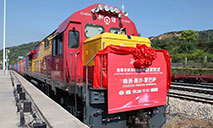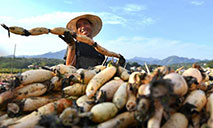Negative list for market access to be further shortened
China will continue to shorten the negative list for market access this year, as part of the country's ongoing efforts to optimize its business environment and introduce greater opening-up, according to analysts.
The government's intensified efforts to revise the nationwide negative list have shown the country's firm determination to expand market access and build an efficient, fair and unified domestic market, they said, which will also help inject new impetus into the economy and foster high-quality development for the long run.
The National Development and Reform Commission, China's top economic regulator, unveiled on Friday the latest draft version of the negative list for market access.
The draft list for 2021 indicates areas where investment is prohibited or restricted; all other areas are presumed to be open. It now comprises 117 items, compared with 123 in the 2020 version, according to the NDRC.
The NDRC posted the full text of the draft negative list online to seek public opinion from Oct 8 to 14.
Pang Chaoran, a researcher at the Chinese Academy of International Trade and Economic Cooperation, said the draft is part of the country's ongoing efforts to continuously deepen reforms and expand opening-up.
Pang said a unified negative list for market access in all regions will help China build a high-standard market system that is open and competitive, providing a driving force for high-quality development.
"The government's continued efforts to shorten the negative list will help further ease the market access in a wider range and in larger fields," he said. "More efforts are also needed to continuously implement the commitment to 'one list for the whole country' and relax market access in fields such as services and consumption."
Citing the 14th Five-Year Plan (2021-25), Pang said the government should also ramp up efforts to improve the systems and mechanisms for the market allocation of production factors, promote the building of a high-standard market system and form a unified, efficient and well-regulated domestic market featuring fair competition.
NDRC data show that China unveiled and revised the negative list for market access for three consecutive years, 2018 to 2020, and the number of items on the list has been reduced by nearly one-fifth.
Cui Weijie, deputy director of the Chinese Academy of International Trade and Economic Cooperation, said China's continued efforts to improve market access are conducive to expanding opening-up at higher levels and creating the new "dual circulation" development pattern, which takes the domestic market as the mainstay while the domestic and foreign markets complement each other.
"Continuously shortening a nationwide negative list is key to fostering high-quality development over the long run," Cui said. "As China is transitioning to a new stage of high-quality development, the country needs to continuously deepen reforms and opening-up as well as build an efficient, fair and unified domestic market."
Leading executives of multinational companies have also expressed their confidence in China's market, while speaking highly of the country's continued efforts to improve the business environment.
Samson Khaou, executive vice-president of Dassault Systemes Asia-Pacific, said the French industrial software company has been dedicated to the China market over the past decade and will expand its investment in China over the next five years.
"China represents a high-potential-growth country and market for us. … We're going to accelerate the investment (in China)," he said.
Silver Fern Farms, New Zealand's leading processor, marketer and exporter of meat products, is also looking to continuously increase its investment in China.
Alex Wang, Silver Fern Farms' manager for China, spoke highly of China's continued efforts to improve the business environment.
"Seeing the Chinese market's rising growth potential and local people's growing need for red meat, we're confident about our future growth in the China market," he said.
Photos
Related Stories
- China mulls negative list for cross-border services trade in FTZs
- China to promote implementation of negative list for cross-border services trade: Xi
- Negative list for services takes effect in Hainan
- China to quicken formulation and introduction of 2021 version of negative list for foreign investment: MOFCOM official
- China releases negative list for cross-border services trade in Hainan
Copyright © 2021 People's Daily Online. All Rights Reserved.










